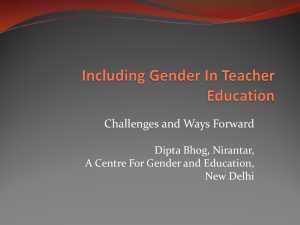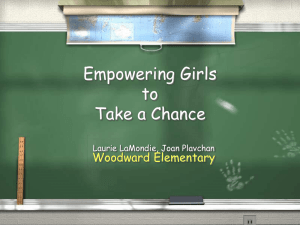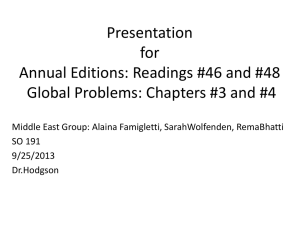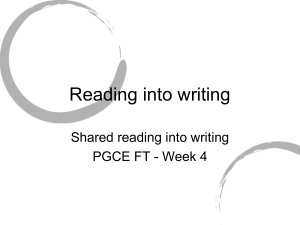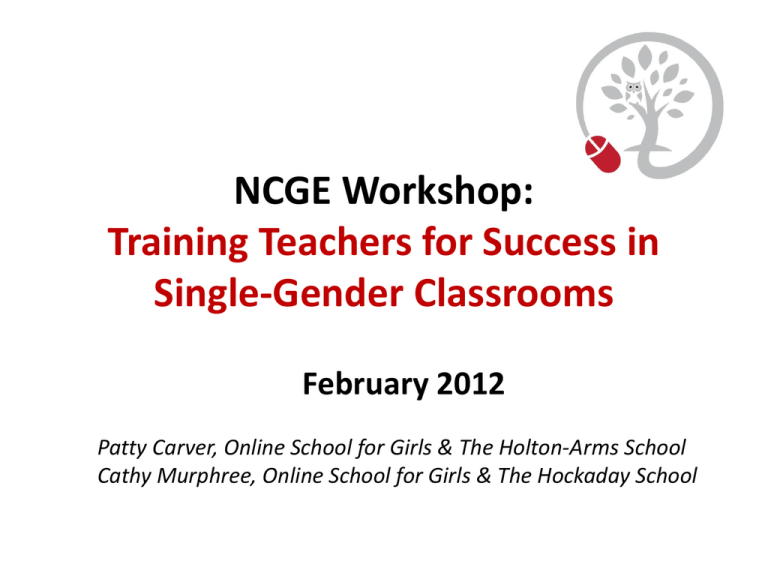
NCGE Workshop:
Training Teachers for Success in
Single-Gender Classrooms
February 2012
Patty Carver, Online School for Girls & The Holton-Arms School
Cathy Murphree, Online School for Girls & The Hockaday School
Twitter Backchannel
During this workshop and afterwards, we encourage you
to join in an ongoing discussion about training new
faculty for our schools using a Twitter backchannel.
• Log into your Twitter
account.
• Include #OSGPD in your
tweets.
• Search for #OSGPD and
follow the discussion.
How Do We Prepare New Faculty?
• With what perceptions and expectations do our
new teachers arrive?
• How can we provide a safe place for them to
explore these?
• How do we not only assimilate our new teachers
to our schools but also to the broader girls’
school community?
• And…with all that school startup involves, how do
we do this important work on top of everything
else?
Online School for Girls
Communication, Collaboration, Application and Creativity
ESSENTIAL QUESTIONS
1. What makes independent schools unique?
2. Are all-girls schools about more than simply separating the
sexes?
3. What life-long benefits do single sex educational experiences
offer?
4. Are there implications for leadership?
5. How can girls’ schools address cultural gender expectations and
biases?
6. Are there gender differences that impact teaching and learning
practices?
7. How do we address the broader issues of societal
support for girls and women?
8. Where can a teacher go for more guidance?
Getting Started
Getting Started
Pre-Course Tasks:
1. Create free
VoiceThread account
2. Update their profile
for Haiku
3. Introduce
themselves to
everyone
4. Ask questions
Course Guidelines
Getting the Most Out
of this Online Class
•Plan to check the Haiku course page at least
every other day to keep up with assignments
and communication with fellow participants.
•Actively participate in online discussions and
VoiceThread projects.
•As you are contributing to discussions or
other online activities, feel free to reference
the readings or other sources you may find in
the course of exploration.
• Ask questions!
Online Communications:
"Netiquette"
•
Respect the confidentiality of what is
shared in class, as well as the privacy of
all participants.
•
Be sure to review all digital content
before you share it online.
•
Be cautious about expressing emotion,
whether intentional or unintentional
•
Be sure to cite all resources referenced
in your work for this course.
Week 1 Overview
EXPERIENCE PART OF A LESSON
EXPERIENCE PART OF A LESSON
Themes from Discussion Board
Take a moment to visit with a neighbor…
Can you suggest three perceptions and/or
expectations new faculty bring to their new
position at your school?
Prevalent Themes in
Week One Discussion Board
•
•
•
•
•
•
Looking forward to small class sizes
The ability to focus on individual students
The ability (expectation) to play multiple roles
Freedom from state-mandated tests
Excitement to meet new colleagues
Interest in what research shows about single sex
classrooms
• The internal conflict, for some, of leaving public
schools, and in some cases, urban schools
EXPERIENCE PART OF A LESSON--again
Each week includes a video panel:
• Heads of Schools
• Alumnae
• 2nd year teachers
• Master teachers
EXPERIENCE PART OF A LESSON—again
Christopher Wilson, The Holton-Arms School
EXPERIENCE PART OF A LESSON--again
Please share your thoughts with the group…
If you were creating videos for your new
faculty, what particular strategies in
teaching girls would you want your master
teachers to address?
FEEDBACK FROM COURSE
PARTICIPANTS
FEEDBACK FROM COURSE
PARTICIPANTS
“It was all extremely relevant. I learned a lot from the
experience from the heads of schools, teachers, and the
articles.”
“I think that hearing from new and veteran teachers at
different girls’ schools was extremely helpful. They
offered great advice, a lot of which we can take directly
into the classroom.”
FEEDBACK FROM COURSE
PARTICIPANTS
“I loved reading the responses and amazing
suggestions of my colleagues.”
“Reading the articles, then reading posts from
classmates. It was interesting how students chose
different aspects on which to comment.”
“Watching the videos and reading my colleagues'
comments.”
FEEDBACK FROM COURSE
PARTICIPANTS
“The Online School for Girls was a great way to take a
professional development course… The course
coordinators were very knowledgeable about the class
content and interacted in a very positive way with the
group.
The OSG course allowed me to collaborate with
colleagues from across the country from the comfort of
my home or hotel room (since I travel in the summer),
so the convenience was another great feature.”
FEEDBACK FROM COURSE
PARTICIPANTS
“This OSG course gave me a good sense of what it will be like
teaching in an all-girls' school… The research we read was
also enlightening. It made me feel less stressed about my
new beginning!”
“Even after teaching in a coed independent school for four
years, I found this course very informative not only about
teaching girls at a girls’ school but also about teaching in
independent schools, single-gender or coed, as well.”
OTHER BENEFITS
• Depth of discussion
• A growing bibliography
• Collaboration between the course teachers and
the involved schools
• Participants’ collaboration and relationshipforming at their home schools
• Being introduced to colleagues at other schoolseven before school started—starting out with a
network
SHARE YOUR THOUGHTS . . .
• Could online professional development be a
part of your school's orientation program?
• Do you see other applications for this model
or a similar program?
Dates for 2012
• Session I: May 25 - June 22
• Session II: June 22 - July 20
• Session III: July 20 - August 17
QUESTIONS . . .


